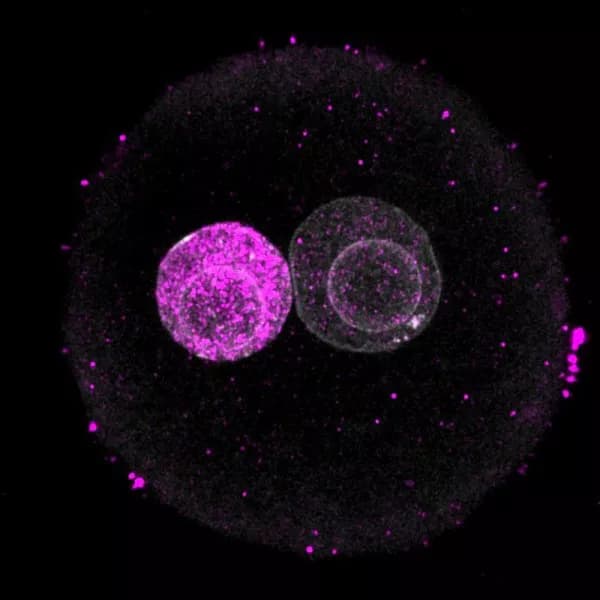
Fertilized Egg Cells Trigger, Monitor Loss Of Sperm's Epigenetic Memory
Scientists from the Institute of Molecular Biotechnology (IMBA) in Vienna, Austria, have discovered how an embryo's genomic integrity is safeguarded during the first 24 h after fertilization. Insights into this mechanism have implications for improving in vitro fertilization.
The events triggered when sperm meets an egg are not only life changing for the parents but deeply fascinating from a scientific point of view, too.
The mother of all cells
Following fertilization, DNA from the mother's egg cell and the father's sperm cell constitute the genetic blueprint of the single-cell embryo or zygote. The incoming paternal DNA contains modifications that facilitate an "epigenetic memory" of its sperm state. Proteins provided by the fertilized egg act to largely erase this memory in order to generate a totipotent embryo that can give rise to a whole new individual. The mechanisms underlying natural reprogramming to totipotency are remarkably efficient but remain poorly understood. "To put this into perspective, reprogramming to induced pluripotency in cell culture takes several days to weeks whereas reprogramming to totipotency in zygotes occurs in less than 24 h," says Kikuë Tachibana-Konwalski, who devotes her laboratory's research to understanding the molecular secrets of egg cells and zygotes.
New life, new epigenetics
Reporting research in the scientific journal Cell, Vienna-based scientists from the Institute of Molecular Biotechnology (IMBA) have discovered that not only do fertilized egg cells trigger epigenetic reprogramming of sperm DNA but this process is closely monitored to safeguard genomic integrity.
"When the sperm enters the egg cell, the densely compacted male chromatin has to be entirely 'unpacked' and restructured around protein scaffolds called histones," explained Sabrina Ladstätter, first author of the study. "Using fertilized mouse eggs, we showed that the egg cell actively triggers demethylation of the paternal DNA -- in other words, it initiates epigenetic reprogramming by stripping any previous epigenetic memory passed on from the father. This allows the zygote to start afresh and create its own epigenetic memory and life history. This process is not without risks: demethylation can cause lesions in the DNA that can be fatal for the new organism. It is known that these lesions can lead to chromosome fragmentation, embryo loss or infertility."
A molecular checkpoint
The researchers identified a surveillance mechanism that not only monitors DNA lesions caused by epigenetic reprogramming but also fixes the damage. They revealed that lesions in the paternal DNA caused by demethylation activate a zygotic "checkpoint" that prevents cell division until these lesions are repaired. This mechanism therefore ensures that reprogramming is completed within one cell cycle and protects genomic integrity at the volatile single-cell embryo stage. Interestingly, they also found that the conditions under which embryos are cultured affect the stringency of the checkpoint response.
Hope for better IVF treatments?
"Our findings have potential implications for improving in vitro fertilization techniques," said Kikuë Tachibana-Konwalski, senior author of the study and a group leader at IMBA. "It will be exciting to explore how cell culture conditions enhance the zygote's intrinsic surveillance and repair mechanisms, thus leading to better quality embryos and potentially more successful pregnancies."
Materials provided by Institute of Molecular Biotechnology. Note: Content may be edited for style and length.
Disclaimer: DoveMed is not responsible for the adapted accuracy of news releases posted to DoveMed by contributing universities and institutions.
Primary Resource:
Ladstätter, S., & Tachibana-Konwalski, K. (2016). A Surveillance Mechanism Ensures Repair of DNA Lesions during Zygotic Reprogramming. Cell. DOI: 10.1016/j.cell.2016.11.009
Related Articles
Test Your Knowledge
Asked by users
Related Centers
Related Specialties
Related Physicians
Related Procedures
Related Resources
Join DoveHubs
and connect with fellow professionals

0 Comments
Please log in to post a comment.